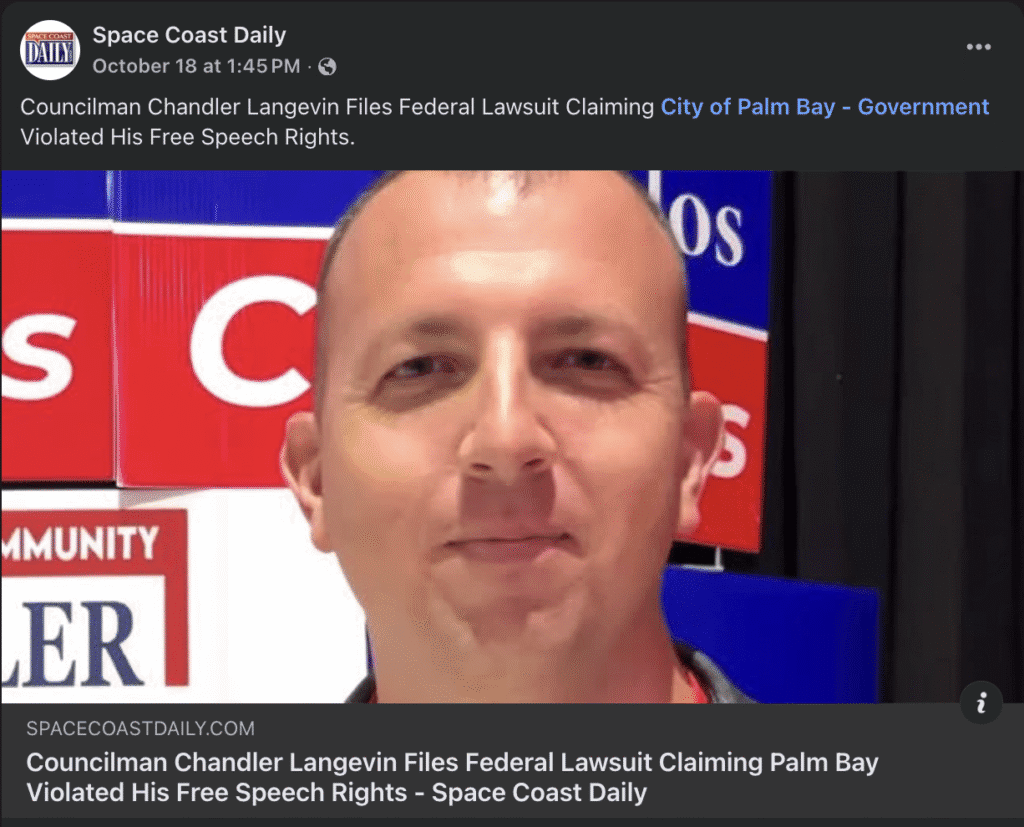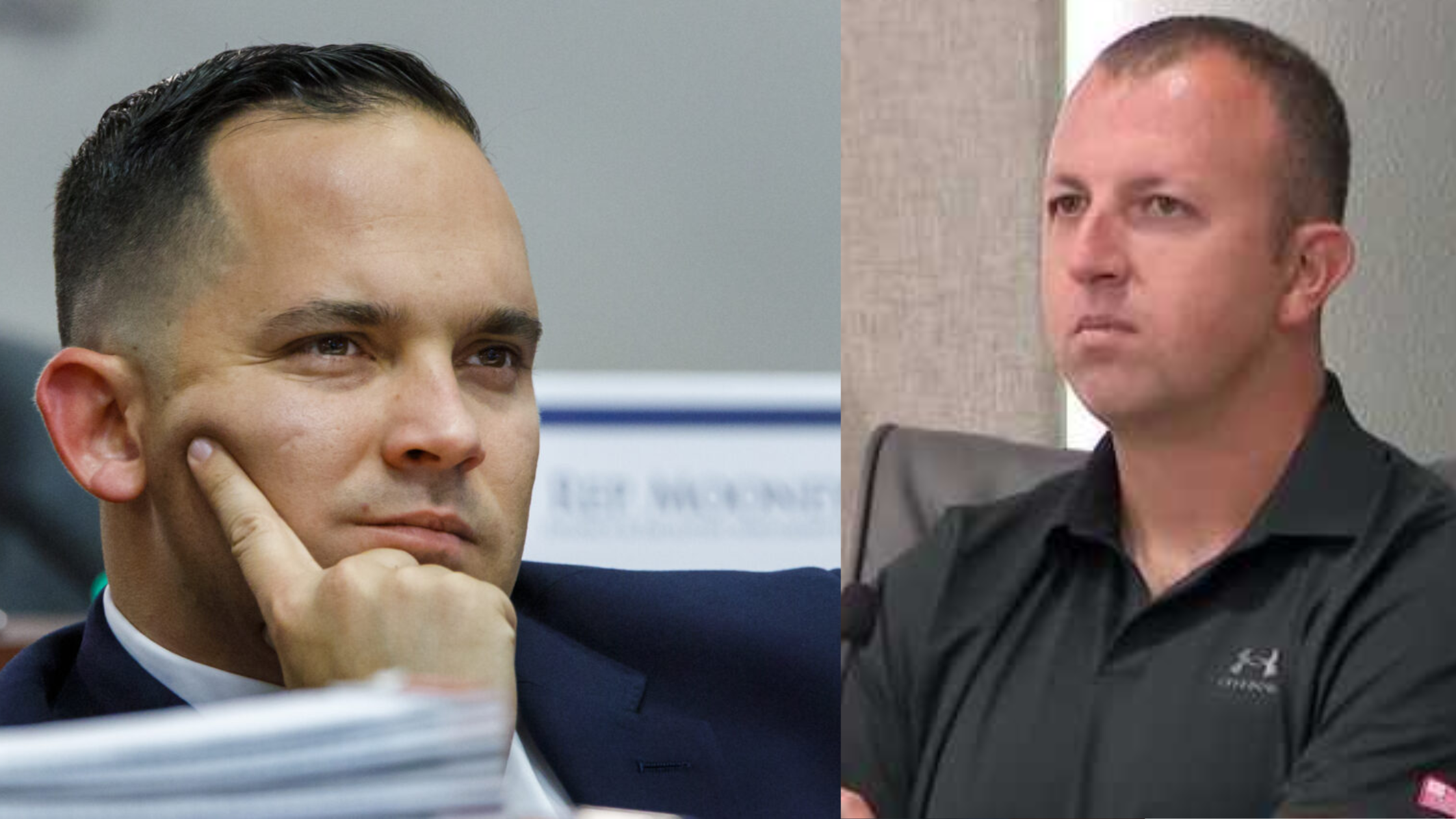Palm Bay, FL — Palm Bay City Councilman Chandler Langevin has filed a federal lawsuit against the City of Palm Bay, claiming his censure violated his First Amendment rights. The case, filed October 20 in the U.S. District Court for the Middle District of Florida (Case No. 6:25-cv-02015-GAP-NWH), alleges that the city’s actions were “unlawful retaliation” for his political speech and deprived him of due process. (View the entire lawsuit at the end of the article) It should be noted that another outlet that promotes Langevin falsely claimed last week that the lawsuit had already been filed last Friday as promised. That claim and others by that same “publication” were false and confused citizens of Palm Bay. The article has since been removed but the false Facebook post remains.


However, the city’s own legal record in the form of detailed remarks delivered by City Attorney Patricia Smith during the council meeting where the censure was finalized appears to directly contradict nearly every major claim in the lawsuit.
In the cover letter accompanying the lawsuit, Langevin’s attorney, Anthony Sabatini, misspell both his own last name and the word “retaliation,” one of the very causes of action he asserted in the filing.
The error has already sparked mockery online, with some saying it reflects the lack of professionalism surrounding the case.


City Attorney Cited the Supreme Court Case Sabatini Ignored
Before the lawsuit was even filed, City Attorney Patricia Smith carefully addressed the exact First Amendment arguments Sabatini now raises in court.
In her remarks from the October 16 City Council meeting, Smith cited the U.S. Supreme Court’s 2022 ruling in Houston Community College System v. Wilson — the controlling precedent that sharply limits the kind of lawsuit Langevin has filed.
Smith explained that censures are a long-recognized tradition in American government, dating back to the 18th century, and that legislative bodies have an established constitutional right to censure their own members for conduct or speech that brings the body into disrepute.
She summarized the case for the Council:
“Elected bodies in this country have long exercised the power of censure of their members… going back to colonial times.”
“Congress has censured members not only for objectional speech directed at fellow members, but also for comments made to the media and conduct for speech that damages the nation.”
Smith emphasized that Wilson held censures to be constitutionally permissible as long as they do not remove a member from office or strip them of fundamental duties.
“Council does not have the ability to suspend or expel a member,” she explained. “This resolution doesn’t do that. It does not stop him from fundamentally doing his job as an elected official.”
City Attorney: The Council’s Censure Is Protected Speech
Perhaps most damaging to Langevin’s lawsuit is Smith’s point that the censure itself is a form of government speech, protected by the very same First Amendment Langevin now claims has been violated.
“Just as Mr. Langevin has a right to free speech, the body has a right to free speech,” Smith told the Council. “Its ability to speak cannot be quelled by his.”
She added that public officials “are expected to shoulder a degree of criticism from their peers and constituents” and cannot claim that such criticism “chills their free-speech rights.”
Her Legal Analysis Matches the Supreme Court’s Reasoning Exactly
Smith explained to the Council that the restrictions imposed, requiring Langevin to gain consensus before placing items on an agenda, limiting his committee reports, and removing him from boards were administrative and not fundamental to his elected duties.
“Fundamental to any elected official is the ability to vote,” she said. “This does not restrict his ability to vote. It doesn’t even restrict his ability to advocate for an ordinance… It doesn’t fundamentally stop him from doing anything.”
That distinction is crucial. Courts have repeatedly held that internal council privileges (like agenda access or committee assignments) do not create constitutional property or liberty interests, and therefore, removing them does not violate due process — precisely the opposite of what Sabatini’s complaint asserts.
Smith concluded her remarks by reminding the Council that her interpretation was not optional but binding:
“All courts must actually follow the United States Supreme Court. Whether they agree or disagree, they must follow the binding precedent.”
You can watch Palm Bay City Attorney Patricia Smith’s legal argument presenting the item below:
Ethical and Political Questions Remain
Beyond the shaky legal foundation, the lawsuit has raised ethical concerns about who is paying for Langevin’s defense. Sabatini told the media the case involves “substantial legal fees,” while Langevin has publicly admitted losing his “primary source of income.”
If Sabatini’s representation is free or discounted, it could constitute a reportable or prohibited gift under Florida Statutes §112.3148 and §112.313(2).
The city’s ethics code requires disclosure of any benefit provided to a public official “because of their position,” especially if the fair market value exceeds $100.
When viewed alongside Smith’s detailed legal reasoning, Sabatini’s lawsuit reads as a political document more than a legal one. Every major claim in the complaint (retaliation, deprivation of rights, overbreadth) was preemptively addressed and refuted by the city’s own attorney, citing the highest court in the land.
Even if the lawsuit survives initial dismissal motions, precedent heavily favors the City of Palm Bay. Courts have consistently ruled that censures like this one are permissible expressions of institutional accountability, not unconstitutional punishment.
For now, the only tangible result of Langevin’s legal offensive may be another round of controversy and another bill for taxpayers to foot if the case is quickly tossed out.
cl-case










